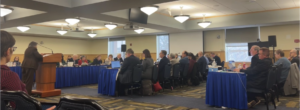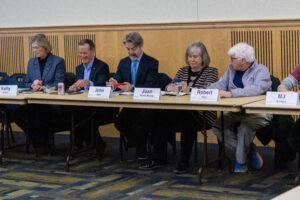On Jan. 23, the Maine Climate Council launched a special meeting called by Governor Janet Mills to discuss remedies as communities recover from three extreme weather events.
Mills recently requested that President Joe Biden issue a Major Disaster Declaration for 10 Maine counties: Androscoggin, Franklin, Hancock, Oxford, Kennebec, Penobscot, Piscataquis, Somerset, Waldo, and Washington, as they recuperate from inland flooding, power outages, and public infrastructure damage.
The Dec. 18 storm “led to the worst inland flooding since the 1980s,” according to Dr. Susie Arnold, an ocean scientist who directs the Center for Climate and Community at Island Institute.
U.S. Senators Susan Collins (R-ME) and Angus King (I-ME), along with Representatives Chellie Pingree (D-ME1) and Jared Golden (D-ME2), sent a letter on Jan.16 urging the President to grant Governor Mill’s request.
“Due to the extent of infrastructure damages, State resources are not adequate to meet local recovery needs. We urge you to expeditiously approve Governor Mills’ request for Major Disaster Declarations for the counties in question,” the Maine Congressional Delegation wrote in the letter.
If the request is approved, Maine’s ten hard-hit counties will receive federal funds to repair roads, utilities and infrastructure, which is projected to cost $20 million. Since the extensive public infrastructure damage is ineligible for commercial insurance coverage, current state funding is inadequate for reconstruction, risking overwhelming local governments without sufficient federal assistance.
“Resilience refers to the character of people and the character of a state. It’s easy to think that the three storms in the last month are aberrations. We’ve got to think about the future,” the Governor remarked, addressing the Maine Climate Council members, congressional delegation staffers, state working groups, and leaders from Maine towns.
“Storms are made more violent by the egregious effects of climate change,” said Governor Mills, citing that the recent storms underscored the urgency for investing resources to strengthen Maine’s resilience.
Congresswoman Pingree, also attending the Council meeting, referred to the three to four-foot coastal storm surges and inland floods that damaged fishing piers, wharves, marinas, and boat yards. “This is not something we can wait a hundred years on,” said Representative Pingree.
Jessie Perkins, Bethel Area Chamber of Commerce Director, described the Dec. 18 storm, which submerged roads with rising flood water from the Androscoggin River, and how “27 water-related rescues were made by the Bethel Fire Department.”
Commissioner Melanie Loyzim of the Department of Environmental Protection elaborated on residential oil tank spills at flooded basements. “We received more calls in one week than in one month,” said Loyzim. “We can’t get permits issued fast enough to get people back to work,” the Commissioner continued. Loyzim referenced L.D. Bill 20230, which would authorize people to elevate their docks by a couple of feet to prepare for extreme weather conditions.
Maine CDC Director Dr. Puthiery Va explained that the Dec.18 storm’s loss of electricity led many homeowners to rely on fireplaces or generators, which increased carbon-monoxide exposure. Waterborne illnesses are also closely monitored, as reports indicate contaminated drinking water systems.
“Single event storms of every few years seem to be over,” said Director Pete Rogers of Maine’s Emergency Management Agency. Portland received its highest tide in history, beating its 1978 record of 14.17 ft. “This is the new normal. Heavy precipitation events are becoming more common in Maine. We’re seeing increased trends of storms coming in from the southeast,” Dr. Arnold confirmed.
The Climate Council discussed solutions for resilient infrastructure, facilitating floodplain restoration and raising mechanical and electrical systems in high-hit areas to mitigate hazards. Dr. Arnold recommended developing emergency flood protocols for all stages of weather events and engineering better attachments for working waterfronts. New construction projects should be avoided in hazardous areas to reduce the likelihood of flood damage. In addition to relocating at-risk infrastructure and elevating structures, the ocean scientist suggested protecting vulnerable buildings using armor or nature-based solutions.
The Maine Climate Council, composed of scientists, industry leaders, and local and state officials, was created by Governor Mills in 2019 to reduce greenhouse gas emissions. After submitting a four-year plan to the Governor in 2020, the Council must deliver an updated plan by Dec. 1, 2024. The disaster relief response plan will present immediate and long-term solutions for hazard mitigation, floodproofing, and infrastructure improvements to strengthen Maine’s resilience to future extreme weather events.


















